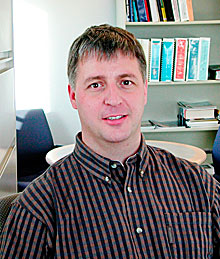  |
| HOME | THIS ISSUE | CALENDAR | GRANTS | BACK ISSUES | < BACK | NEXT > |
Pathobiologist named director of Connecticut Sea Grant program
by Peg Van Patten - January 16, 2007
|
||||
Pathobiology and veterinary science professor Sylvain De Guise has been named director of the Connecticut Sea Grant College Program at the University's Avery Point Campus. Connecticut Sea Grant is part of the National Oceanic and Atmospheric Administration's National Sea Grant College Program, a network of 31 university-based programs in coastal and Great Lakes states. De Guise will lead and oversee the Connecticut Sea Grant College Program's efforts to develop fundamental knowledge, technology, trained personnel, and public awareness that will advance the sustainable use of coastal and marine resources and environments, said Gregory J. Anderson, vice provost for research and dean of graduate education, who announced the appointment. De Guise joined the University in 1999. For the past year and a half, he has been interim director of the Connecticut Sea Grant Program, during a competitive national search for a new director. "As interim director since 2005, Dr. De Guise has led the program successfully through the development of a new strategic plan and its five-year program assessment," says Robert J. Johnston, associate director of Connecticut Sea Grant. "The staff of Connecticut Sea Grant are excited at the prospect of continuing our success under his leadership." De Guise received his Ph.D. in immunotoxicology at the Université du Quebec à Montreal, and his D.M.V. degree (veterinary medicine) at the Université de Montreal. Earlier in his career, De Guise participated in research cruises that involved the capture and sampling of wild beluga whales in the Arctic and was asked by the Turkish government to evaluate the health of a beluga in the Black Sea. He is a scientific advisor for the United Nations' Environment Program's Marine Mammal Action Plan, and a member of its international emergency team. More recently, he investigated the effects of the pesticide malathion on Long Island Sound lobsters. |
| ADVANCE HOME UCONN HOME |

